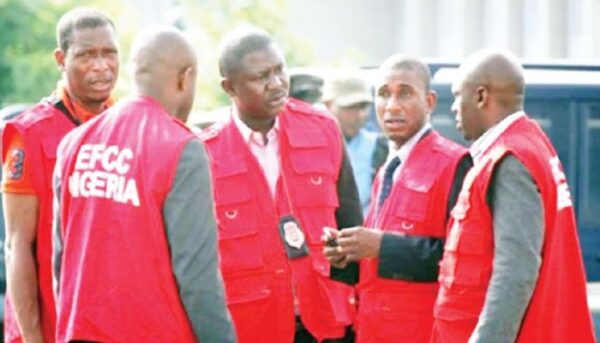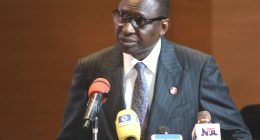 The Economic and Financial Crimes Commission (EFCC) has arrested several former top officials, including recently sacked managing directors of Nigeria’s three state-owned refineries, over the alleged misappropriation of nearly $3 billion allocated for the long-awaited rehabilitation of the facilities.
The Economic and Financial Crimes Commission (EFCC) has arrested several former top officials, including recently sacked managing directors of Nigeria’s three state-owned refineries, over the alleged misappropriation of nearly $3 billion allocated for the long-awaited rehabilitation of the facilities.
Among those apprehended are the former Managing Directors of the Port Harcourt Refining Company, the Warri Refining and Petrochemical Company, and the Kaduna Refining and Petrochemical Company. These arrests are part of an expansive investigation into the management and utilisation of funds released for the overhaul of Nigeria’s moribund refining infrastructure. The total sum under investigation stands at a staggering $2,956,872,622.36.
According to EFCC findings, the agency is scrutinising the disbursement and use of $1.56 billion allocated to the Port Harcourt refinery, $740.67 million earmarked for the Kaduna refinery, and $656.96 million approved for the Warri facility. These funds were intended to restore functionality to refineries that had, for decades, been dormant or operating far below optimal capacity.
The investigation gained momentum following the recent dismissal of the three refinery managing directors by the new management of the Nigerian National Petroleum Company Limited (NNPCL). Among those relieved of their duties were Mr. Ibrahim Onoja, former MD of the Port Harcourt Refining Company, and Mr. Efifia Chu, former head of the Warri Refining and Petrochemical Company. Other senior officials across NNPCL subsidiaries, including Bala Wunti, former head of the National Petroleum Investment Management Services (NAPIMS), were also removed as part of a sweeping shake-up targeting officials approaching retirement or allegedly involved in corruption.
A top source within the EFCC confirmed to reporters that the arrests were made in connection to the ongoing investigation into the controversial and poorly executed rehabilitation projects.
“We are probing billions of dollars released over the past few years to revamp our refineries,” the source revealed. “Some of the top officials who oversaw the management of these funds have already been arrested. Others are still being tracked. Nigerians have every right to demand answers about what happened to these funds—and why our refineries remain largely non-functional.”
Shockingly, investigators reportedly uncovered a massive N80 billion in bank accounts linked to one of the sacked managing directors. “He has been with the EFCC for over a week now,” a source at NNPCL disclosed. “The scale of what we’re uncovering could be even larger than the Emefiele case. It’s deeply disturbing.”
This comes amid widespread criticism of the NNPCL for allegedly deceiving the public about the true state of operations at the country’s refineries. Both the Warri and Port Harcourt facilities were touted as having resumed operations in late 2024—Warri in December and Port Harcourt in November. But subsequent revelations showed that the Port Harcourt refinery was operating at less than 40% capacity, while the Warri refinery was shut down barely a month after it was declared operational due to safety concerns within its Crude Distillation Unit.
Industry experts and stakeholders have described the situation as an embarrassment, accusing the NNPCL of orchestrating a public relations stunt to create the illusion of success. An April 2025 document obtained from the Nigerian Midstream and Downstream Petroleum Regulatory Authority revealed that, despite consuming $897.6 million in rehabilitation funds, the Warri refinery failed to produce petrol and was fully shut down as of January 25, 2025.
The document also showed that the $1.5 billion invested in the Port Harcourt refinery had yielded little return, with the facility producing at a meagre 37.87% capacity, far below its expected output.
A document obtained by reporters dated April 28, 2025, and titled ‘Investigation Activities: Request for Information’, confirmed that the EFCC’s investigation has expanded to include the immediate past Group Chief Executive Officer of NNPCL, Mele Kyari, along with 13 other senior former executives of the corporation. The EFCC formally requested certified records of their salaries, allowances, and retirement benefits from the current NNPCL management.
Other high-profile names listed in the EFCC’s request include Abubakar Yar’Adua, Isiaka Abdulrazak, Umar Ajiya, Dikko Ahmed, Ademoye Jelili, Mustapha Sugungun, Kayode Adetokunbo, Efiok Akpan, Babatunde Bakare, Jimoh Olasunkanmi, Bello Kankaya, and Desmond Inyama.
Despite growing calls for transparency and accountability, the NNPCL has so far remained silent. Its spokesperson, Olufemi Soneye, has not responded to repeated enquiries regarding the deepening scandal and the arrests of top officials.
Critics argue that the NNPCL’s opaque operations and its failure to deliver on the promised refinery rehabilitations have only widened the trust gap between the public and the state-owned oil company. “This is not the first time Nigerians have been misled,” said one oil sector analyst. “The scale of deception is appalling. The public deserves better.”
The Warri Refinery and Petrochemical Company (WRPC), which was commissioned in 1978 and has a processing capacity of 125,000 barrels per day, had been inactive for years until its brief restart in December 2024. Located in Ekpan, Uvwie, and Ubeji areas of Delta State, the plant also includes petrochemical units capable of producing 13,000 metric tonnes of polypropylene and 18,000 metric tonnes of carbon black annually.
President Bola Tinubu had earlier praised the NNPCL for revamping the Warri refinery, commending the resumption of operations at 60% capacity. However, recent reports indicate the restart was short-lived, and the real state of the facility has fallen far short of the administration’s claims.
With billions unaccounted for and production still failing to meet targets, the EFCC has vowed to intensify its investigations in the coming weeks. The anti-graft agency’s spokesperson, Dele Oyewale, was not available for comment as of the time of filing this report.








